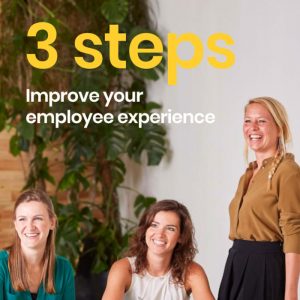When considering to use big data and HR, be sure to ask yourself this simple question: Are these tools really going to help improve our organization’s performance?
Should HR managers provide their teams with more Big data tools and devices?
Recently I visited the HR Tech 2018 conference in Las Vegas. The first speaker was analist Josh Bersin. He shared how technology rules our world. People check their smartphones 150 times a day. Our agendas are managed by four to five different tools. We are overwhelmed by messages via email, social media and social networks. We are overstimulated. We spend more time shushing technology, than actually working. It’s almost impossible to get your job done in silence. And all of this in an era that is in desperate need of more creativity and agility.
A bizar experience
Bersin’s story appealed to a large audience, his words hit the nail on the head. Then it was time for the next speaker to get on stage. A product manager working at a large tech company showcased their newest tool and its many great features. The software was over the top. People were flabbergasted by his Powerpoint presentation. It was obvious that this was one of the tools that pushed people closer to exhaustion. It was a bizar experience after Bersin’s impressive opening talk. I looked around at the other people in the audience and saw that I wasn’t the only one feeling this way.
Big data and HR
How can the current obsession around big data HR Tech be explained? Maybe, it’s because HR is one of the last industries to be computerized. If you take a closer look at sales and manufacturing for example, there’s software for every aspect of every process. Until recently, HR was the playing field for social-study softies. Now all of a sudden,big data in HR is hip and happening. There’s a tool for every aspect of our job. Suppliers are capitalizing on recent trends. There’s software that improves agility and supports the flexible deployment of staff. Other tech trends I saw at the conference include Virtual Reality (VR), wearables, Artificial Intelligence (AI) and Blockchain.
Work-life balance
Amidst all this turmoil, one question kept running through my mind: how do employees focus on their actual job with all this software madness going on around them? Should HR managers even want to provide their teams with more tools and devices? The average employee spends 25% of their time on reading and answering emails already. Is it a good idea to add three more tools for the standard feedback to that? Why would you increase complexity? Isn’t that contrary to your wish to improve your employees’ work-life balance and prevent them from suffering a burn-out?
Employee experience in 3 easy steps
Learn the best ways to improve the employee experience in your organization with these 3 easy-to-follow tips! Get your copy today!
Download: employee experience tipsNobody likes standard surveys
Are you thinking of using HR Tech? Be sure to ask yourself this simple question: Are these tools really going to help improve our organization’s performance? If the answer is no, end of story. The same goes for surveys. Maybe it’s odd to hear these words coming from the managing director of a company that collects employee feedback. But this is exactly why at Effectory we know that surveys are only useful if you are actually prepared to listen. This means: asking your employees the right questions at the right time, instead of firing the same random questions at them three times a day. That will get you nowhere. Technology only adds value if you have a clear goal in mind.
Make sure your research matches your strategy
Before you conduct any research, have a conversation with a few of your internal stakeholders. Talk to the management, the works council and some of your employees. Ask open questions, like: What is going on? What are current issues in the workplace? And make sure your research matches your organizational strategy. Checking these boxes will help you receive the feedback you are looking for more than you can imagine! Feedback that will really help you create the best onboarding process, prevent employee turnover and stimulate personal development.
Big data in HR with a purpose
Advanced technology is absolutely necessary. It helps to share the right questions, with the right employees at the right moment. And, it makes answering the questions easier and more fun. That’s why our surveys are as short as possible and presented in a simple way. In an era that is overwhelming people with tools, user interfaces shouldn’t add any more stress. Especially not when you’re researching the employee experience.
Touch is important too
If you are collecting feedback at a high frequency, you’ll need more than technology. Touch is essential. Only then will you be able to ask the right questions and receive answers that will transform insights into actions. In this case, tech is not used to impress employees, but to actually listen to them. To collect their input and use it to improve your organization and the way employees experience their job. The effectiveness of a HR-tool depends only slightly on its features. How you choose to use the tool is more important. Only when your survey matches your strategy, will you be able to turn the results into actions that will boost your business.
Employee Engagement
Increase employee engagement through action-oriented feedback. Using a single platform, you can collect reliable data, analyze the results, and share insights.
view employee survey solution